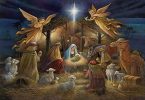
Theme: God wants us to self-empty ourselves for others that we may share in His glory.
Scripture readings: Is. 50:4-7; Ps. 21:8-9,17-20, 23-24; Phil. 2:6-11; Mt. 26:14-27:66
Today’s liturgy of the word tells about the obedience of Jesus in going through the suffering and death in order to fulfil the plan of God. The first reading from the book of Isaiah foretold about the suffering of Christ almost seven to six hundred ago. The Gospel of Mathew depicts suffering of Jesus as the Son of God. St. Paul brings out the salvific value of Jesus’ suffering and death by using an ancient hymn. Let us try and understand each of these readings to draw lessons to our lives. We shall meditate on the reading according to their historical settings.
The first reading from the book of Isaiah is called one of the songs of the suffering servant. There are four songs about the suffering servant found in the chapters 40-55 in the book of Isaiah. Today’s text is the third song on the suffering servant. The prophet does not reveal the identity of the suffering servant. There is vague reference to Israel in the second suffering song but it is not very clear. The songs depict the gentle humility, suffering and active mission of the suffering servant. If all the four songs are put together in the context of chapters 40-55; it gives us clear picture of the suffering servant. Every song unfolds the function of the suffering servant. The suffering servant is seen as a gentle and determined to deliver justice and truth to the nations. He is personified as the Israel who would restore Israel to Yahweh. He is the disciple of God who is obedient even in his sufferings. At last, his humiliation reveals the astonishing truth that his suffering is the atonement of sins. The scholars have put these qualities together to see if there was any one in the Old Testament who could fulfil them but they have found none except Jesus Christ. Jesus went through suffering just like the suffering servant in the book of Isaiah. His suffering brought about redemption of human beings.
All the Gospels narrate passion of Christ but we have the Gospel of Mathew this year on the passion Sunday. Jesus’ passion began from the last supper to the death on Calvary. St. Mathew narrates various events in his passion narratives. Beginning with, Judas betrayed Jesus even though Jesus loved him till the end. Jesus sweated blood in the garden of Gethsemane. Jesus was taken to the High Priest in the night for questioning. Peter denied three times although he had promised that he would not. The disciples had run away for the fear of death. Jesus was dragged to Pilate. People chose Barabbas, the dreaded criminal over innocent Jesus. They shouted against him, “crucify him”. They preferred to take his blood upon themselves. The soldiers beat him. They mocked him. They spat on him. They made him carry his cross. While hanging on the cross, they made fun of him. Finally, he was crucified. In the midst of all this suffering, Mathew ends the passion of Jesus with the confession of centurion, “in truth this was a son of God”. The centurion recognised Jesus as the Son of God in his suffering. This is the culmination of Jesus’ suffering.
In the second reading from the letter to Philippines, St. Paul writes about Jesus’ self-emptying to fulfil the plan of God. It is an ancient hymn. The authorship of hymn is much disputed. St. Paul uses this hymn to teach his people to self-empty themselves for others. The hymn has twofold structures. In the first part, it depicts Christ’s abasement and in the second part, his exaltation. It says that Christ enjoyed a Godlike way of being. In the Jewish tradition, being like God means immunity to death (Wis. 2:23). Jesus did not exploit his divinity for his selfish gain while he was in the form of man. It is in contrast to Adam who saw his selfishness. Christ rendered himself powerless just like the slave. When Jesus took the human form which means to say that he wilfully chose to die because that is the condition human being has in this world. Every human has to die. Jesus, the son of God lowered himself unto death. Death of Jesus indicates two things. Firstly, Jesus was fully human and secondly, he was obedient to His Father when the entire world is alienated from God. Jesus chose to die in one of the extremity of human abasement i.e. crucifixion. No one wanted to die like that. Jesus self-emptied himself so God rewarded him. Therefore, his name is highly exalted, every knee should bend in heaven and on earth and under the earth. This threefold listing emphasises the universality of homage. Every tongue confess that Jesus Christ is Lord. The title was used only for God in the Old Testament is now used for Jesus.
With the celebration of passion Sunday, we enter into the holy week, the most sacred time in the liturgical calendar. We are invited to reflect on the mystery of Christ’s suffering. The readings help us to understand, God chose to become man which means to say he chose to die for the love of humanity. It was the most convincing plan of God to prove His love for the humanity; God dying for man. (Can we pause for a while and reflect on this fact) Jesus fulfilled the plan of His Father. He completely emptied himself. Therefore, God highly exalted Him in heaven, on earth and under the earth. Jesus wants us to imitate Him. He wants us to self-empty ourselves in the present challenging situation for others that we may share in His glory.
While we are confined to our homes due to COVID 19, let us make the best use of this time. I propose few spiritual activities for the holy week:
1) We can read the passion of Christ from all the four Gospels and make a comparative reading 2) We can just meditate on the Crucifix of Christ for a quite some time 3) We can watch a movie “passion” 4) We can make a way of the Cross with special reference to Scriptures 5) Make a meditation on the last words of Jesus. 6) Recite sorrowful mysteries of the Holy Rosary, etc.
Fr. Alex D’Mello






